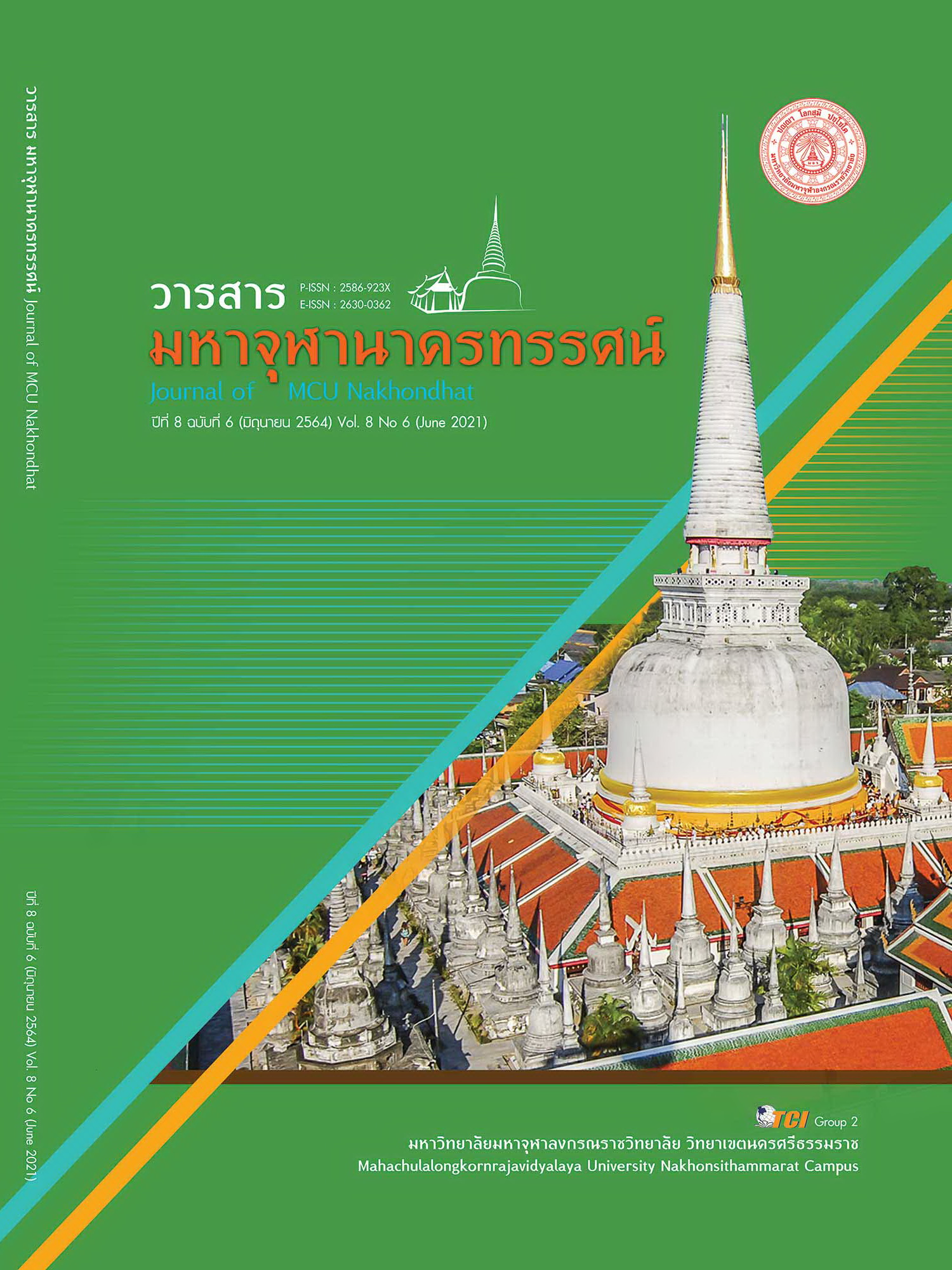SAPPURISTHAM AND SELF-MANAGEMENT IN THE AGE OF CORONA VIRUS DISEASE (COVID-19)
Main Article Content
Abstract
Sappuristham and Self-Management in the Age of Corona Virus Disease (COVID-19) It is a living self-management style that has changed completely from the past. Changing self-practices, it is to focus on oneself rather than on those around them. Represents a big change for Modern living Teachings in buddhism with the highest aim to end suffering Especially the suffering of the heart That society, community and oneself in modern times are facing many problems Which society today There has been a change in self-management style. Completely from the past as a result, the concept of people has changed. The focus is on giving priority to oneself. Interested in their benefits Rather than paying more attention to the people around Or common interests Therefore, the adoption of Buddhist principles that are believed to be the principle of Sappurisatham to manage themselves in the era of coronavirus disease (COVID-19) So as not to cause unwantedproblems Both to oneself and others Especially the psychological suffering that was too much during the time of the debilitating disease And able to live happily in society Sapphurisdharma 7 things Which consists of thạmmạỵỵu ta , the knowledge of the Dharma. Xat thanyu ta, knowledge of attitudes. Xạt tạỵỵu ta, Knowledge of Mattayuta, approximation. Kalạỵỵuta, Acquaintance. Pri saỵỵu ta, Knowing about the company or community. and pu khkhlp ro prạỵỵu ta, Know-how For the principles of Sappuristham will help people adhere and follow. Use it as a self-management principle, able to live in society without any problems. Which results from the person Will affect as a group to be a good society.
Article Details
References
บุญทัน ดอกไธสง. (2537). การจัดองค์การ (พิมพ์ครั้งที่ 4). กรุงเทพมหานคร: โรงพิมพ์มหาจุฬาลงกรณราชวิทยาลัย.
ประสงค์ สุ่นศิริ. (2562). ค่านิยมที่เปลี่ยนไปในสังคมไทย. เรียกใช้เมื่อ 1 มกราคม 2564 จาก https://www.naewna.com/politic/columnist/42108
ปราณี รามสูตร และจำรัส ด้วงสุวรรณ. (2545). พฤติกรรมมนุษย์กับการพัฒนาตน. กรุงเทพมหานคร: สถาบันราชภัฏธนบุรี.
พระธรรมปิฎก (ป.อ. ปยุตฺโต). (2546). พจนานุกรมพุทธศาสตร์ ฉบับประมวลธรรม (พิมพ์ครั้งที่ 12). กรุงเทพมหานคร: มหาวิทยาลัยมหาจุฬาลงกรณราชวิทยาลัย.
. (2546). พุทธธรรม ฉบับปรับปรุงและขยายความ (พิมพ์ครั้งที่ 10). กรุงเทพมหานคร: สหธรรมิก.
พระมหาสมควร ศรีสงคราม. (2550). การศึกษาความสัมพันธ์ระหว่างสัปปุริสธรรมและพละธรรมกับการปฏิบัติงานของผู้นำสถานศึกษากลุ่มเขตธนใต้สังกัดกรุงเทพมหานคร. ใน วิทยานิพนธ์พุทธศาสตรมหาบัณฑิต สาขาวิชาการบริหารการศึกษา. มหาจุฬาลงกรณราชวิทยาลัย.
พิเชษฐ์ บัญญัติ. (2548). หน้าที่หลักทางการบริหาร. กรุงเทพมหานคร: โกทูโนว์.
มหาวิทยาลัยมหาจุฬาลงกรณราชวิทยาลัย. (2539). พระไตรปิฎกภาษาไทย. ฉบับมหาจุฬาลงกรณราชวิทยาลัย. กรุงเทพมหานคร: โรงพิมพ์มหาจุฬาลงกรณราชวิทยาลัย.
สมพงศ์ เกษมสิน. (2514). การบริหาร (พิมพ์ครั้งที่ 3). กรุงเทพมหานคร: สำนักพิมพ์เกษมสุวรรณ.
สมโภชน์ เอี่ยมสุภาษิต. (2536). ทฤษฎีและเทคนิคการปรับพฤติกรรม. กรุงเทพมหานคร: สำนักพิมพ์มหาวิทยาลัย.
สุรชัย โชคครรชิตไชย. (2563). การระบาดของไวรัสโคโรนา (โควิด-19) ในประเทศไทย. เรียกใช้เมื่อ 8 มิถุนายน 2563 จาก https://he01.tci-thaijo.org/index.php/JPMAT/ article/view/242185
อนันต์ เกตุวงศ์. (2523). การบริหารการพัฒนา. กรุงเทพมหานคร: โรงพิมพ์มหาวิทยาลัยธรรมศาสตร์.
อนุตรา รัตน์นราทร. (2563). รายงานผู้ป่วยโรคติดเชื้อไวรัสโคโรนา 2019 (COVID-19) ผู้ป่วยรายแรกของ ประเทศไทยและนอกประเทศจีน. วารสารสถาบันบำราศนราดูร, 14(2), 68-79.


